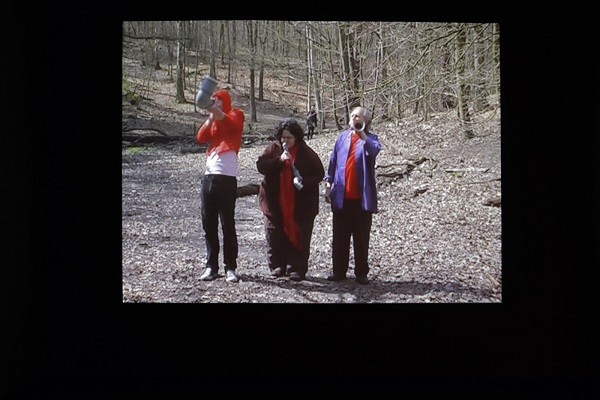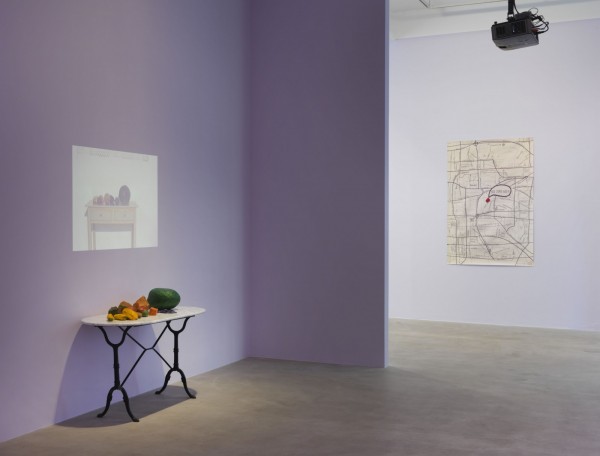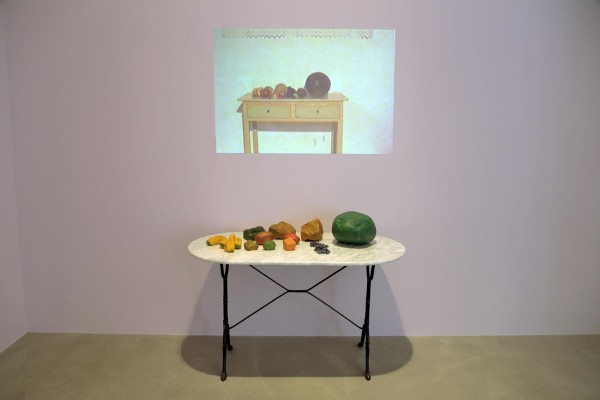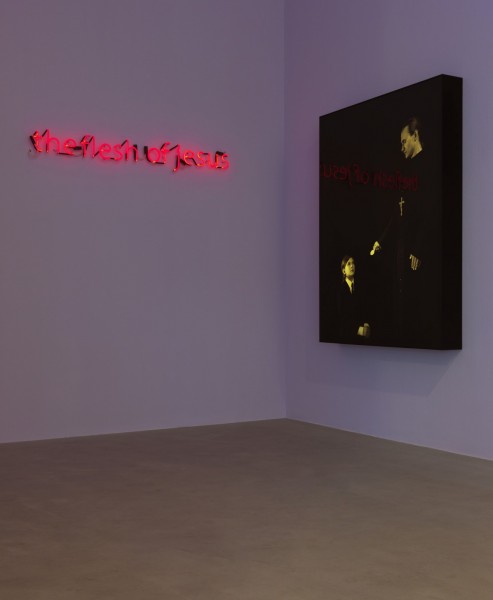08 2015
Here at the Center: Jimmie Durham. In Europe. At NBK Berlin.
Beginning to work in art is never a decision, says Jimmie Durham. The artist, poet and activist born 1940 in Arkansas began to work as a sculptor in 1964, while he was active since the early 1960s in the American civil rights movement. In 1973, he graduated in Fine Arts in Geneva and returned to the U.S. In the 1970s, he was a co-founder and chairman of the International Indian Treaty at the United Nations, where his work led to the Declaration on the Rights of Indigenous Peoples. In 1987, Durham left the U.S., settled in Mexico and since 1994 in Europe, where he has lived in Dublin, Marseille, Rome and Berlin.
From June until August 2 he is presenting “Here at the Center” curated by Marius Babias at NBK Berlin, an emblematic space of the Berlin art scene. Babias, who is specialized in the relationship between art and public space in Berlin in the 1990s collaborated with Durham in a show focusing on the developments of the European Union, observed through the relationships between community and space, history and environment and a critical attitude towards political structures. I met Durham at his home in Berlin-Schöneberg. We talked about art, life, money and Europe.
TL: I wanted to ask you about two videos you're showing at “Here at the Center”: one is “Grunewald”, which consists of a collective action in the middle of this forest in Berlin playing with wood, musical instruments. It's a group of people who seem to know each other. The other one is called “Berlin 2000”. They were like logbooks of your memory, life, the history of your inner circle. What can you tell me about it? How did this all begin? Is there a relationship between them?
JD: As we made them, there was no relationship, and when you do things you just do them, then you see that you do keep a narrative going you do have your own person and you cant speak outside of your own person, you can only act. The first video, “Grunewald” Maria Thereza (Alves) and I did in Berlin maybe two years already, 2000 and 2001 maybe. And we did it because the Haus der Kulturen der Welt in Berlin had a show called “Heimat” and they asked us to do it. And we never thought about Heimat at all. I never thought about a home in this sense the german word has.
TL: Yes, because the German concept of Heimat means Fatherland and Home at a time.
JD: Yes, a very germanic concept!. But... we had a lot of friends at that time. We were kind of charmed by the idea of doing this. So we got people together and went to a very nice Portuguese restaurant. It doesn't exist anymore. The guy who was the owner was a construction worker and a singer from Portugal. He retired and started this restaurant, a really excellent restaurant. We would go there like once a week, because it was very close to my studio. So we threw a big party and invited a whole bunch of people we had met in Berlin and be filmed in the restaurant. The owner sang a beautiful song. Even former Fluxus member Emmet Williams almost sang a song. I sang a song. Maria Thereza and I had started German lessons with the DAAD, but our teacher quit, because he thought I wasn't serious. And the two problems of me being serious are that I do sing a lot all the time. And she made us sing songs. They were little children's songs. But she would pitch them in a key that was not good for my voice, so I would pitch them an octave lower and she thought it was against her. She didn't see it as necessary for my voice. And I don't react quickly. I'm a very slow speaker and very slow at learning things. But when I learn, I usually learn. But she quit. She said that I wasn't serious. That was like being in school again.

Jimmie Durham, Grunewald. Exhibition view, Neuer Berliner Kunstverein, 2015. Foto: Claudia del Fierro
TL: What kind of role do friends play in your work and life at a time? Because it seems to me that in both videos, Grunewald and Berlin 2000, where we see this dinner at the restaurant, the German lessons, the actions in the forest; we always see friends everywhere: people related to you, sometimes in a relatively intimate way. And you're this way not producing a concrete project but a dynamic.
JD: Yes, a dynamic, that's exactly what it is. It certainly is. And... Maria Thereza had the idea of the Grunewald film. She had a little whistle for singing bird songs. She said: we should make a video. “Yes, let's do a video” I said. “We should get a lot of people together and let´s make bird songs!”.
TL: These both videos are pretty important because you both are recognizing in them the possibilities of the city, you´re recognizing the city in a way...
JD: Yes, I think... Yeah, I think it´s true. And there´s something special about Berlin and friendship because Berliners are not really good at friendship (Laughter). There are many foreigners who come to Berlin and all my life I've been with a lot of people, I come from a very, very large family with a lot of uncles and cousins, etc. And I don't know how to be on my own exactly. I'm often by myself and I like being by myself. But if I were always by myself, I would go out and find some people. Because I just need that constant interaction with other people. If I didn't have it, I would look for it until I found it, because otherwise you don't get any new information. If you don't meet other people, you just rely on what you already know. You might think you are very smart, you might be very, very smart, but you can't stay smart. You're just repeating the same smart you had yesterday. And that's not very smart.
TL: And then, there is this another video with these childhood songs. It's called just like that, “Childhood Songs”.
JD: Oh, yeah. That's the one I just did it with Barbara Wien and Wilma Lukatsch. I grew up in the south of the U.S. in the 1940s. I have a curse in my life, still there. If I hear a song, I can't get rid of it. I never hear an entire song, almost never, and even if I did, I would remember it. If I pass by a music store, whatever music is being played, I remember it. It never releases my brain. I can't get them out of my head. Like a real curse. But this horrible songs that were floating in the air in the U.S. in the 1950s. Songs about the blood of Jesus, songs about making fun of women, any stupid songs, are with me. And I find myself humming one of them for no reason. It's like a real curse. So, I thought that I would sing some of them and see what happens.
TL: Then, you're reproducing then an experience of yours.
JD: Yes. The funny thing about this work is that it's called “Songs of my childhood”. And so many people automatically assume that it will be some sort of wise, funny, indian stuff. As though colonization never happened. My childhood in the public part was an absolute hell. And so was anyone else's in the 1940s. But the popular music in the U.S. in the 1890s was horrible. In the 1900s it got worse. 1920s it got worse. 1930S it got worse. Every decade it gets worse. You think that it cannot get so bad. Popular music is always bad. But in the U.S. it´s really bad, really bad. Like this fucking “How much is this Doggy in the Window” by Patti Page... That was not a song, but it was number one for a long time! It was Ronald Reagan's favorite song. It truly was! (Laughter).

Jimmie Durham, Still Life with Architectural Elements (2000) / Sie sind hier (2000). Exhibition view, Neuer Berliner Kunstverein, 2015 | Neuer Berliner Kunstverein / Jens Ziehe

Jimmie Durham, Still Life with Architectural Elements, 2000. Exhibition view, Neuer Berliner Kunstverein, 2015. Foto: Claudia del Fierro
TL: And the objects you are collecting, they are like three works, the ones on the table with this piece of metal with numbers related to a building by Zaha Hadid...
JD: Yeah, the MAXXI in Rome...
TL: Yes, and the other sculptures with faces and bodies made of objects and remains you´ve found... They are things getting other meanings which are not the originally intended.
JD: It seems that way, but they don´t do.
TL: What are you doing with them, then?
JD: I´m innocent by standard. I walk alone, I used to walk alone, now I drive alone (Laughter). And things come up to me. A little piece of metal says: “Hi, what are you doing?” (Laughter) And I say: “Leave me alone. I don´t want a piece of metal. But I get a lot of metal. I have a lot of beautiful pieces of metal. Things are charming and they come up to me. And ask if they can join in something! If they are small enough, I pick them up, take them home. And after a while, they start maybe there, maybe one piece of metal lays next to a piece of glass for a few of years and they begin to have some relationship that they tell me about. So after a while they get together in an art show in some way. They´re glued together, sitting next to each other or something. It´s not my fault, it´s theirs. I´m the innocent by standard.
TL: So, they´re talking by themselves in some sort of way.
JD: Yes. Just like street cats and dogs.
TL: And, what kind of role does your literary work play in relationship to this theme: Finding things everywhere? Because the poems I´ve read, like the one you showed me today, they have some kind of incidental spirit. They happen to be, they are like short events or memories... Would you feel yourself just as a writer or...
JD: I started my adult life writing poetry and not making art. It was years before I started making art. I started trying to figure out what english was doing and what human language was doing, because language says that it´s not doing anything, just talking and it also says that we cannot think without it. And when something tells me that you can't do this without it, I start resisting right away. I'm famous with Maria Thereza. She says don't move, I start moving. You can' t do this, I start doing it. It's automatic, I did it as a child, it drove my mother crazy. Language tells us that we have no way of thinking without language, that we have to think in whatever languages were given. And I know it's not true because, well, I just know it and I think that many artists know it. Musicians certainly know it. Quite a few mathematicians know that there are no human languages that will describe mathematics, that it takes mathematics to try to describe language, even that doesn't work. And then I have this English language which must be the silliest language in the world. It's a really crazy, crazy language that makes the craziest bunch of things all the time. It's an absolutely insane language that pretends to be just language like “I'm just talking”. So, I started thinking about language early in English and I got into the habit of it. And a word comes along. Some silly word because English has so many silly words that you think: “Oh, that could be a word”. And there it is, pretending to be a normal word. And then it reminds you another word. And that word reminds you another word. And when we say that things remind us of things. We're not pure. We have all of our experience behind us. We have our politics behind us, we have our knowledge, everything is part of it, not behind, but part of things. If this word reminds me of another word and the act of reminding... There is a lot of stuff going on in my brain! Between these two words, the connections that are started with these two words. I say, and I think it's true, that poems happen, that I don't write them, they happen and I record them. But at the same time I know that nobody else would record them! So it has to be some sort of me recording them. But it's not an isolated me, it's always... I wouldn't know how to imagine being isolated. If you're not social, you're not there. There is no way that we can be if we're hermits. If we're obviously being socially hermetic, we're being hermetic to ourselves! You're always being social in one way or another. I was talking to a woman from New York a few days ago and she was talking about fashion and how it comes to be that the male business suit is taken so seriously now. I said how the business of fashion is taken so seriously now. We don't delight in fashion anymore, we take it as reality instead of human play. But we're always in uniform. If you wear a business suit, you're wearing a businessman's uniform. If you're naked, you're in a naked man's uniform. We're fashion animals. We don't have a way of not dressing. Dressing is what humans do. And it's always a social act. Everything we do is social act. When we're reading, we're reading socially. You don't read for your own entertainment. You do read for your entertainment, but it's you socially that is reading socially, not you reading your own book over and over. It all seems so simple to me then that I must be social at all times. Because that's where... That's how I get to be. Otherwise I'm not... I'm not...
TL: You're not...?
JD: At all.
TL: OK!
JD + TL: (Laughter)

Jimmie Durham, The Meat of Jesus, 2012. Exhibition view, Neuer Berliner Kunstverein, 2015 | Neuer Berliner Kunstverein / Jens Ziehe
TL: This several years of your political activity in New York and in Geneva and so on... Afterwards you take the decision to work in the arts, and to a hundred percent. Isn't it? How does this happen? How come?
JD: There are always more levels of reality than we're comfortable with. Always so many levels of reality. But one reality is that I never decided to be an artist. People say: “When did you realize that you were an artist? Never, I never did realize it. But when I was a young man, just out of the military service, and just learning to read books, I started writing poetry and performing poetry and engaging with a theatre group, and I always had to have another jobs. During the day I worked hard, jobs of hard labor, every day. And I was always making things: carving, making, drawing whatever... And someone said: “That looks like art! You should sell it!” That's how I got involved in art. Someone said: “That looks like art! You should sell it!”. So immediately it was mercenary, immediately it was commercial. And immediately I was... It was so beautifully satisfying: I took five wooden bone carvings to a local gallery. And I sold three of them right away. And the top price was three hundred dollars. I didn't make that in a week with hard labour! It was such a good money that I thought: “Yeah, this is for me!” (Laughter). I love art, that's the thing! (Laughter).
TL: (Laughter) No, but there are for sure other factors influencing this...
JD: Because I was already doing political theatre. And I was writing poetry, which is already political. You can't just write about flowers. You have to write about someone trampling the flowers. Otherwise it's not poetry! So I was already political. And I was already making things, as when I was a little child. After a while I realized that I was cheated and I was cheating myself. If you make something to sell and sell it, you can never get enough money! Money is so stupid for such things! You need enough money to buy some wine, to buy some pop-corn, have a roof over your head, and to keep doing your things. If you could get five billion dollars, how much wine could you buy? How much wine could you drink? There is no reason to be thinking about money in the sense of art, it's too frustrating, because you want the human interaction – and money is not human interaction, money is just... You get a ticket to some place and then you can get to meet some people (Laughter). I don't know if that makes sense or not, but... I saw within a year, that exchanging art for money is just a bad translation. It doesn't work.

